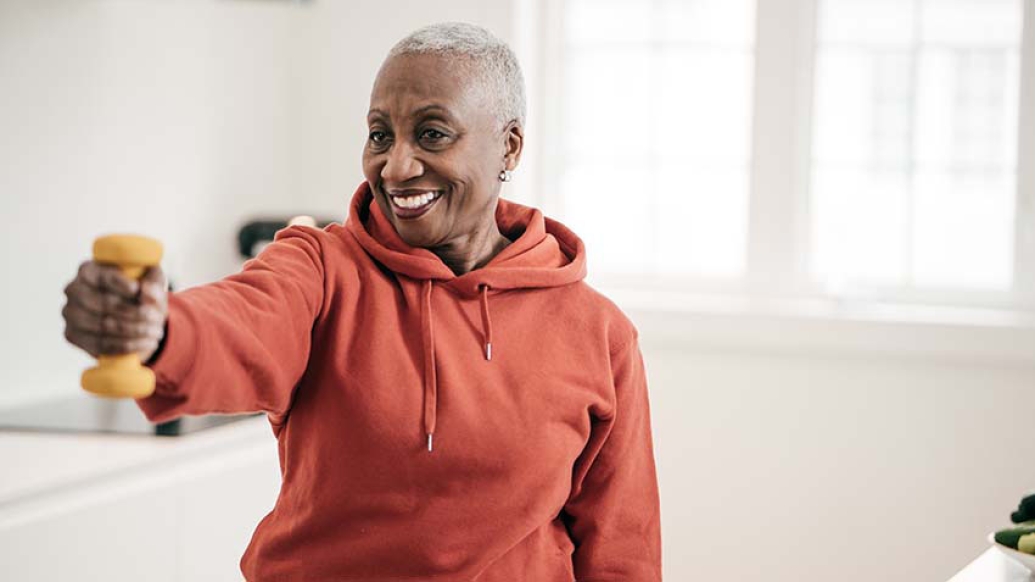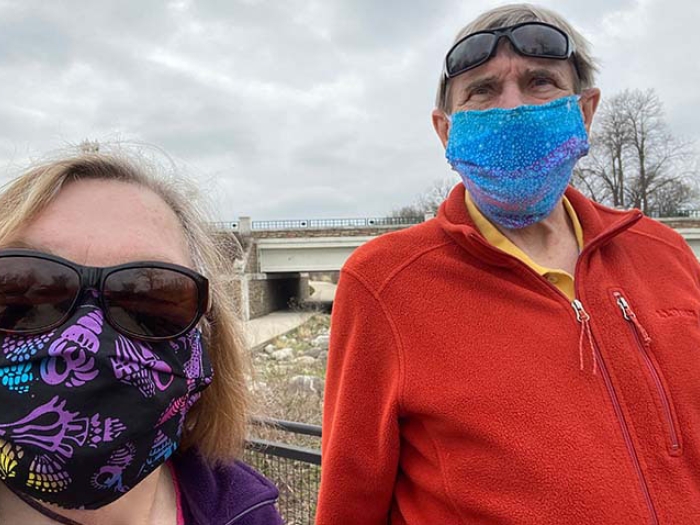If you’re a heart patient in need of cardiac rehab, a Michigan Medicine exercise physiologist helps you stay motivated at home with creative workout ideas.
4:10 PM
Author |

Editor's note: Information on the COVID-19 crisis is constantly changing. For the latest numbers and updates, keep checking the CDC's website. For the most up-to-date information from Michigan Medicine, visit the hospital's Coronavirus (COVID-19) webpage.
Interested in a COVID-19 clinical trial? Health research is critical to ending the COVID-19 pandemic. Our researchers are hard at work to find vaccines and other ways to potentially prevent and treat the disease and need your help. Sign up to be considered for a clinical trial at Michigan Medicine.
As we weather the impact of COVID-19, many of us find ourselves in unchartered territory. This is especially true for heart disease patients whose cardiac rehabilitation has been suspended or those who expected to begin a structured, supervised program and are now left to wait.
But for how long?
With cardiac rehab centers across the country suspending their on-site programs indefinitely, at-home rehab has become the next best thing. And it's critical for heart patients who could be at higher risk for severe complications should they contract the virus.
So how do you stay motivated without the encouragement and guidance of a structured program?
"It's not easy," says exercise physiologist Kari Meyers, who sees patients in the Michigan Medicine Cardiac Rehabilitation program. "But that's no reason to be inactive during the stay-at-home order." Patients with heart disease — whether a heart attack, heart failure, peripheral arterial disease or any other cardiovascular condition — need to be active in order to continue their recovery, she says.
Taking ownership of rehab
These days, Meyers and her co-workers stay in contact with their patients on a regular basis via telehealth phone calls as part of a Home-Based Cardiac Rehab program.
"We maintain contact with our patients to guide them and to answer any questions or concerns they may have." But ultimately, she says, "patients have to take on the responsibility of sticking to an exercise program."
For most heart patients, moderate at-home cardiac rehab is recommended, Meyers says. She advises her patients to "pepper your exercise throughout the day." For example, begin with a morning walk, do strength training midday and yoga at night. "It's not necessary to do a full hour of exercise at one time; instead try for 15 to 20 minutes of movement three or four times a day."
Any combination of movement is beneficial, Meyers says, but she stresses the need for aerobic exercise to get your heart rate up, strength training to keep your muscles strong and yoga to promote core strength and balance.
MORE FROM MICHIGAN: Sign up for our weekly newsletter
"Heart patients often lose postural form during their recovery if cardiac rehab isn't part of their routine," she says. Aerobic exercise is necessary not only to strengthen the heart muscle, but also to strengthen the rest of the body's muscles, which are important for balance and overall endurance. "These are the things that can help keep you from being readmitted to the hospital due to falls or other complications."
Creative ways to move
Since guidelines say it's safe to be outside (with or without a mask or scarf), Meyers suggests walking, but advises patients to go no farther than five minutes from their home and always carry a cell phone unless accompanied by a household member (while adhering to social distancing rules).
SEE ALSO: Seeking Medical Care During COVID-19
"Even if you walk back and forth on your driveway, it's good to get outside for Vitamin D from the sun and fresh air for your lungs," she says. On days when you can't get outside, Meyers recommends the American Heart Association's START! Walking at Home video.
Beyond walking, there are plenty of other creative ways to get your body moving, says Meyers, who emphasizes warming up and cooling down before and after you exercise.
SEE ALSO: Keeping Our Patients Safe During COVID-19
Here are some of the tips she gives her patients:
-
If your home has stairs, climb up and down for 30 seconds at first, gradually increasing the time to one minute as you become more conditioned.
-
Any type of cleaning – whether vacuuming, washing the windows or scrubbing floors – can be equivalent to power walking as long as you keep it up for 30 minutes. "The key is to keep moving," says Meyers.
-
While many of us are binge watching programs without commercial breaks, it's important to stand up every so often to get the blood flowing, says Meyers. She recommends marching in place for even bigger benefits.
-
YouTube exercise videos are readily available and run the gamut — from moderate level workouts and strength training to yoga, meditation and more. Meyers recommends Chair Yoga for Heart Health and 7 minutes of Magic to get you moving.
-
Hone your balancing skills by standing on one foot or walking a straight line. "Be sure to do this in an uncluttered area in case of a fall and use a wall or chair for support," Meyers says.
-
Find fun ways of being active: Dance, tend to your yardwork, play catch outside with a family member. "These can be therapeutic, but can also increase your heart rate and work your muscles."
Like Podcasts? Add the Michigan Medicine News Break to your Alexa-enabled device or subscribe for daily updates on iTunes, Google Play and Stitcher.
Looking forward
Meyers looks forward to the day when she can once again work with her cardiac rehab patients face to face. Until then, she wants them to take ownership of their health and recovery. She believes this new twist on cardiac rehab is encouraging patients to be self-motivated.
"They realize that being physically active is an important part of taking care of themselves."
Not surprisingly, patients tell her they can't wait to come back to the Michigan Medicine program. "They miss the camaraderie and support of a structured, supervised program with people they know," Meyers says. "In the meantime, many of them tell me they're staying in touch with their fellow cardiac rehab patients through FaceTime calls, texting and emails."
For questions about your exercise program, contact the Michigan Medicine Home-Based Cardiac Rehab team at (734) 998-9590.

Explore a variety of health care news & stories by visiting the Health Lab home page for more articles.

Department of Communication at Michigan Medicine
Want top health & research news weekly? Sign up for Health Lab’s newsletters today!





